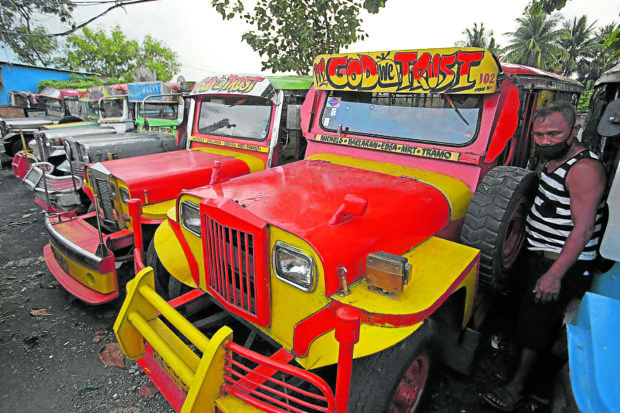
OLD RIDE The pandemic has sidelined jeepney drivers after public transport is restricted to contain the spread of COVID-19. Drivers and operators around the country are bracing for the phaseout of traditional jeepneys as the government moves to modernize public transport. —RICHARD A. REYES
CITY OF SAN FERNANDO—Transport leaders in Central Luzon on Monday asked the Senate to stop the Dec. 31 deadline for operators and drivers to form cooperatives in preparation for the phaseout of public utility vehicles (PUVs).
The Samahan ng mga Tsuper at Operator na Tutol sa Phaseout (Stop), in a petition it filed in the Senate committee on public services, said the “railroading” of the PUV phaseout was “worse than the [COVID-19] pandemic.”
In a statement, Stop cited a warning of the Land Transportation Franchising and Regulatory Board (LTFRB) that the failure to organize cooperatives would lead to the cancellation of individual franchises.
Pushing through
Their jeepneys and buses would also be sidelined by prototype vehicles that are 400-percent more expensive, the group said. According to Transportation Secretary Arthur Tugade, the PUV modernization program would push through to help “improve and strengthen” the public road transport sector.
But Stop said cooperatives would be required to put up a P7-million capital, with drivers or operators being forced to shell out P300,000 per share.
“Pushing the phaseout while under the pandemic violates the government’s COVID guidelines,” the group said, citing the Bayanihan to Recover as One Act (Baro), which disallows any phaseout of public vehicles transitioning to a “new normal.”
It said any law or directive must be repealed to be consistent with Baro.
Decreasing income
Since March, only a few drivers and operators have been allowed to ply their routes, decreasing their income to nil or 1 percent, Stop said.
The group’s chapters in the regions are planning to hold protest motorcades and noise barrages in terminals and LTFRB offices.
For the Baro, 11,450 drivers in 13 regions have registered with the service contracting program of the LTFRB.—TONETTE OREJAS INQ